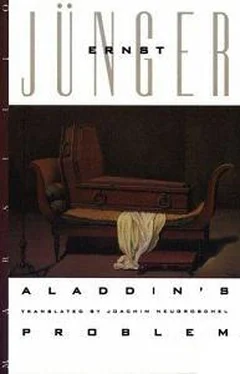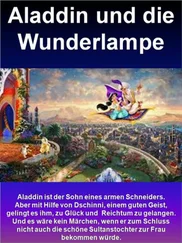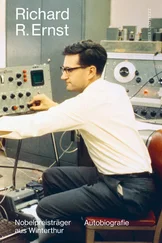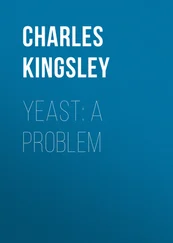As for other treasures, like that of the Nibelungs, only legend knows about them. They rest in the depths: hauling them to the surface can spell disaster, as described in Germanic myths or Oriental fairy tales. What they mean is the world's hoard, from which we live, albeit only on the interest, only on an effulgence that comes from an unattainable distance. Even the sun is merely a symbol, a visible reflection; it belongs to the temporal world. On the other hand, every treasure that is gathered on earth remains a simile, a symbol. It cannot suffice; hence, our ravenous, our insatiable hunger.
The story that best reflects this conflict, if not explicitly, then allegorically, is Aladdin's Problem. What has Baroh learned? That after 1888, Germany's Year of the Three Emperors, History flows into the Post-History of "Titanism." ("Titanism" is the adaptation of ancient myth to modern reality. The Titans, issuing from the union of Gaea and Uranus, are representatives of the primal cosmic powers.) What else has Baroh learned? That this Titanism subjugates all material and spiritual resources in order to rule over the "temporal world" as a demiurge. That the "primal text" thereby turns more and more into silent hieroglyphics. "Aladdin" is Junger's "worker" — the "titanic" agent, who mines and controls the energies of the earth, deluding himself into believing that eventually he will achieve perfection by containing and contenting all needs. This is intimated but not "explained" in the first edition of the novel. The second version, published here by Eridanos, then adds a passage right before the next-to-last paragraph of Chapter seventy-eight. The reliance on allegorical power did not suffice; now this truth is pinpointed:
Aladdin's lamp was made of pewter or copper, perhaps merely clay. Galland's text reports nothing about this matter — all we learn is that the lamp hung from a grotto ceiling. It was not lit, but rubbed, to make the demon appear. He could put up palaces or wipe out cities overnight, whatever the master of the lamp commanded. The lamp guaranteed dominion as far as the frontiers of the traveled world — from China to Mauritania. Aladdin preferred the life of a minor despot. Our lamp is made of uranium. It establishes the same problem: power streaming toward us titanically.
What must happen not only to keep matter from being utilized for the destruction of humanity and its planet, but also to have it go through a process of "spiritualizing," of harmonizing? The author supplies no answer to this question anymore that he did in Eumeswil, a novel he published six years before Aladdin's Problem. However, at the end of the latter story, he brings in Phares, whose task it is to encourage Baroh to cope with his skepticism. This mysterious personage already appeared in Junger's earlier fiction Heliopolis — as commander of the space ship that carries Lucius de Geer toward the infinite edges of the universe. Phares is a bringer of light. His name comes from the French word phares, meaning "beacons, lighthouses." "Les Phares," a poem in Charles Baudelaire's The Flowers of Evil, celebrates eight artists whose works, like beacons, illuminated the darkness of the world. In Aladdin's Problem, Phares once again stands for an unknown power beyond the shocks and tremors ofthe world oflife. He is an emissary who is familiar with the primal text; a mentor with Gnostic instruction. For the Gnostics of Late Antiquity, knowledge appears when the "call" is heard: this "call," as Irenaeus explains, draws both salvation and liberation from the fetters ofthe world. It is precisely this "call" that Friedrich Baroh ultimately follows.
Nevertheless, he is left with the feeling that all earthly things suffer from the imperfectness of Creation. The final station on this road is death. Death claims not only the individual existence but also the historical eras:
After all, historical, especially archaeological interests are closely woven with graves; basically, the world is a grave…
Such are Baroh's musings when he is about to do commerce with the human need for permanence. "A resting place ad perpetuitatem": the formula pops up again. As a narrative, Aladdin's Problem elaborates on the insight that even "eternal" rest is disrupted by the incessant hustle and bustle, the endless upheavals in the Age of Titanism. Actually, Junger has been explaining this theme since his early journals. Thus, in September 1943, he talks about a book he has perused, Maurice Pullet's Thebes, Palais et Necropoles (Thebes, Palaces and Necropolis):
While reading, I again realized how thoroughly, albeit on a lower level, our museum-like existence corresponds to the cult of the dead among the Egyptians. Our mummy of culture parallels their mummy of the human image, and our anxiety about history matches their anxiety about metaphysics: we are driven by the fear that our magical expression could go under in the river of time. Our resting in the bosom of the pyramids and in the solitude of caverns amid artworks, writings, implements, icons of God, jewelry, and rich funereal goods is aimed at eternity, albeit in a more subtle fashion.
His awareness of being involved in a gigantic historical catastrophe led Junger's reflections toward an "anxi
ety about history." Exactly forty years later, he was as agitated as ever about the "chassis" of civilization. However, by the time he penned
Aladdin's Problem
at the age of eighty-five, this angst had gained a sharper metaphysical, and ultimately also a personal profile. The author's own mortality was casting its shadow, as he implies in 1984, in
Author and Authorship:
Time is the great, indeed the only source of tragedy. The vanquishing of time is the great task, one that only leads to symbols. Time overpowers, it cannot be overcome.












